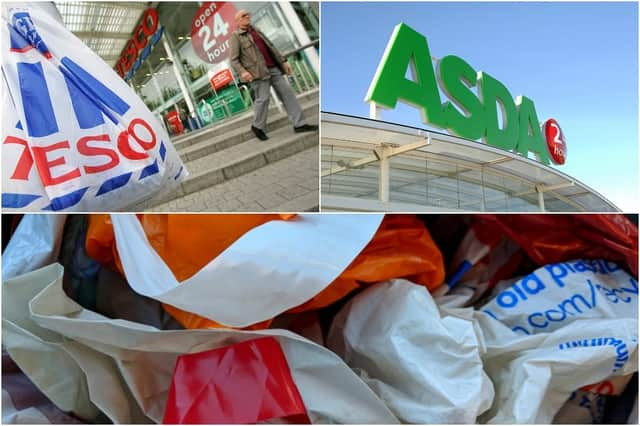Tesco and Asda are introducing sustainable shopping changes – here’s what you need to know


Two of the UK’s biggest supermarkets have announced the changes they will be making in an effort to drive more sustainable shopping in their stores.
Both Tesco and Asda have said they are making a few adjustments, in the hopes that plastic waste levels can be brought down, alongside other important environmental factors.
Advertisement
Hide AdAdvertisement
Hide AdBut just what can you expect to see changing in your local supermarket?
Here is everything you need to know about it.
What’s happening at Tesco?
Tesco’s bid for a more sustainable shopping future involves making changes to the packaging of products sold in its store.
Not only will it make adjustments to the way its own-brand items are packaged – switching from plastic to more readily recyclable and biodegradable materials – the supermarket will also stop ordering in beer and cider packs where plastic is used to hold the cans together.
These plastic rings are one of the most infamous offending items when it comes to harm against wildlife, as not only do they not biodegrade, they can be caught around creatures necks to cause great distress and injury.
Advertisement
Hide AdAdvertisement
Hide AdThis shouldn’t make too much of a difference to the average beverage fan; most major beer and cider producers and many small brewers have already made the switch to cardboard packaging.
Tesco quality director Sarah Bradbury told the Express: “We are working hand in hand with some of the world’s biggest brands to tackle the problem of unnecessary plastic."
It’s hoped the move will eliminate 50 million unnecessary pieces of plastic per year, a major sticking point in the supermarket’s mission to “remove, reduce, reuse and recycle so we use as little material as possible and ensure that all the packaging in our stores can be easily recycled.”
What about Asda?
At Asda, shoppers will again see a renewed focus on sustainable packaging, with the supermarket making the pledge to remove plans to remove three billion pieces of plastic from products in the next four years.
Advertisement
Hide AdAdvertisement
Hide AdThat could impact both how products are sourced, and how they are packaged in the first place; Asda added 20 of its top products, including cotton and cocoa, will be sustainably sourced by 2025.
Roger Burnley, Asda CEO and President, told the Express: “Despite the challenges of the pandemic, we have not lost sight of our wider ESG [environmental, social, and governance] responsibilities.
"Asda is now on the issues that matter most to our colleagues, customers and communities and importantly where we want to be in the future.
"The resilience we have shown during the last 12 months means we are well positioned to help customers make greener, healthier and responsible choices when they shop with us.”
What’s happening with carrier bags?
Advertisement
Hide AdAdvertisement
Hide AdThe changes are announced as the single-use carrier bag charge is set to increase from 5p to 10p and extend to all businesses in England from 21 May.
Under the extension, all stores, including corner shops, will have to apply the charge. Previously only businesses with 250 employees or more had to charge per bag and smaller shops could choose to do so voluntarily.
The 5p levy on plastic bags was introduced in England in 2015, with the most recent figures showing that the number of single-use bags distributed by large supermarkets has fallen more than 95 per cent.
The average person in England now buys just four single-use bags a year, compared to around 140 in 2014.
Advertisement
Hide AdAdvertisement
Hide AdBy extending the charge to all retailers, it is expected that the use of single-use carrier bags will decrease by 70 per cent to 80 per cent in small and medium-sized businesses, the Department for Environment, Food and Rural Affairs (Defra) said.
Paula Chin, sustainable materials specialist at WWF, said: “Plastic pollution is one of the most visible symptoms of the environmental crisis, damaging natural habitats and putting precious wildlife at risk.
“Measures to reduce plastics consumption need to go much further. The UK Government must consider a complete ban on single-use bags and make sure this is not undermined by the sale of ‘bags for life’, which are currently cheaply available and all too often end up as single-use items.”
John Lewis said it was trialling the removal of single-use bags from its Cheltenham, Kingston and Leeds stores from May 21.
Advertisement
Hide AdAdvertisement
Hide AdCustomers will be asked to bring their own bags or buy a reusable bag made from 100 per cent recyclable material costing 50p for a medium size and 75p for a large size.
A version of this article originally appeared on our sister title, NationalWorld